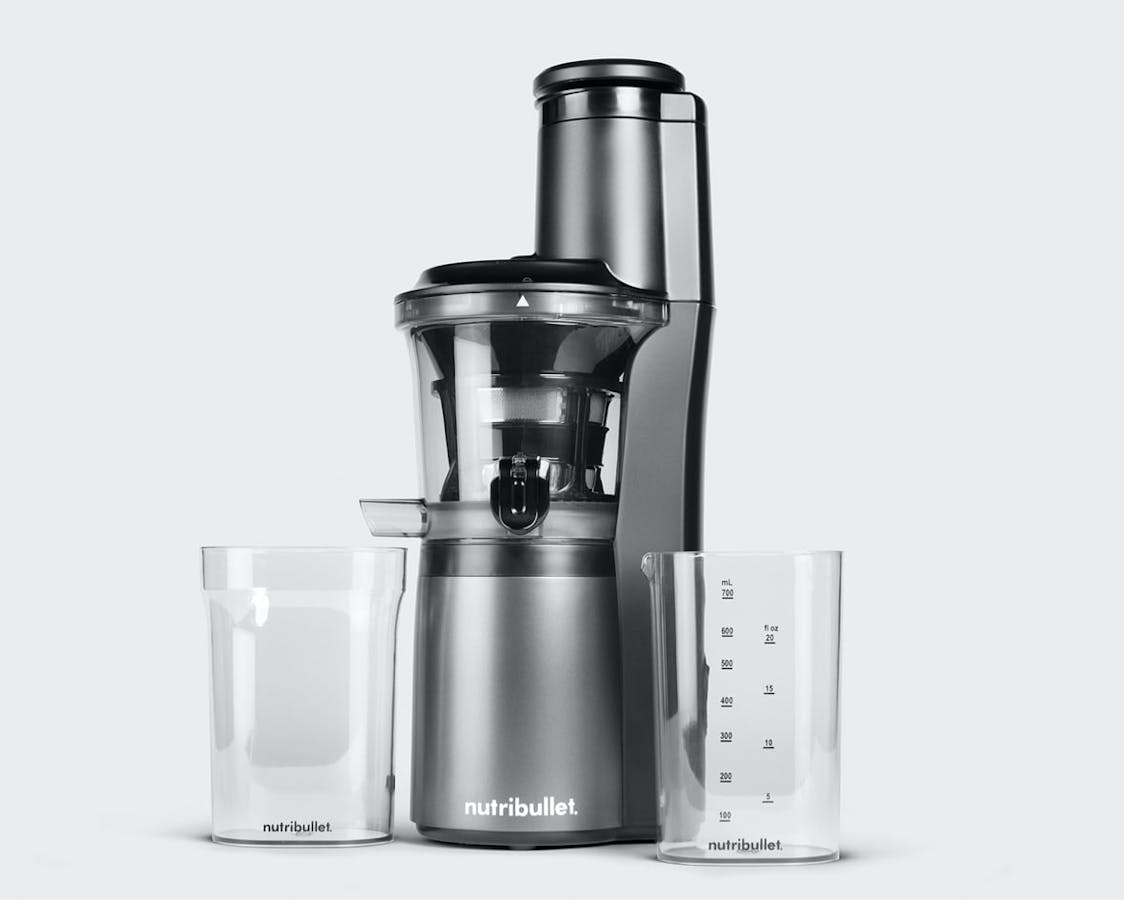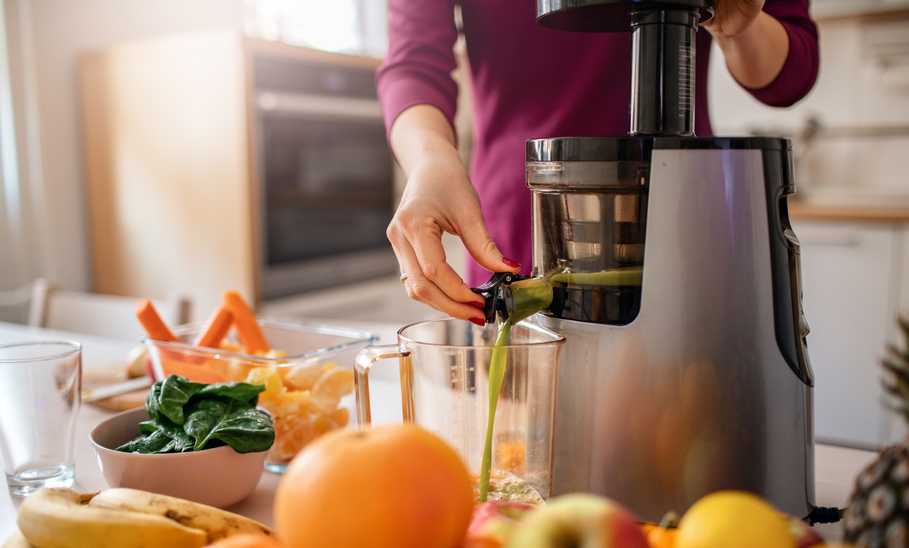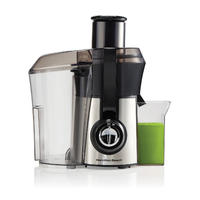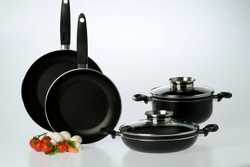Whether you’re on a health kick or just really enjoy the taste of freshly-squeezed juice, you’ll find something on our list of the best juicers for you. You’ll also find expert advice on choosing, cleaning, and maintaining your new juicer to really get the most from it. Grab your glass and let’s get started!
Our top picks for the best juicer

Alessi Plissé Electric Citrus Squeezer
“Practical and easy to clean, this electric juicer is perfect for making a refreshing and healthy juice,” says multi-decade retail expert Hank Reinhart, founder of Sabâvi Home. “It’s made with a pleated design from thermoplastic resin and a cylindrical body that slightly shrinks as it sweeps up to a detachable conical cap. It’s dishwasher safe, but hand washing is recommended.”
Specifications
- Weight: Not listed
- Dimensions: 11 inches high x 7 inches wide x 7 inches deep
- Style: Citrus
- Power: 800 watts
- Special features: Quiet motor
- Warranty: Not listed
- Dishwasher safe: Yes
- Color: White, black, green, red, gray
- Max capacity: 8 fluid ounces
- Price on publish: $139
Pros:
- Stylish design
- Quiet motor
Cons:
- Some customers say it feels a little flimsy for the price
The bottom line:
A stylish and effective citrus juicer that will make short work of any juicy fruit.

Zumoval FastTop Juicer
“If you’re looking for high-volume output of just citrus, the Zumoval FastTop would be the ideal appliance,” says Javaid. “It has an automatic shower and juice level detector, keeping it clean and essentially self-serving. This model is great for bars, restaurants, and coffee shops that have a high demand for freshly squeezed juice.”
Specifications
- Weight: 104.7 pounds
- Dimensions: 38.5 inches high x 24.4 inches wide x 22 inches deep
- Style: Citrus
- Power: 1,035 watts
- Special features: Super fast
- Warranty: 5 years
- Dishwasher safe: No
- Color: Orange, black, silver
- Max capacity: N/A
- Price on publish: $7,550
Pros:
- Can squeeze 45 oranges per minute
- Makes over 50 gallons of juice per hour
The bottom line:
A seriously high-volume citrus juicer, best suited for those who intend to sell a whole lot of juice.

Nutribullet Slow Juicer
A slow juicer–a form of masticating juicer–isn’t some sloth-like device, but rather, it just takes more time than a traditional centrifugal juicer. In terms of a top pick, April Marie, founder of The Curvy Italian sauce range, recommends the Nutribullet Slow Juicer, saying, “It can fit lots of produce and makes a lot of juice per batch. It's also quiet and compact, which is an added bonus.”
Specifications
- Weight: 11 pounds
- Dimensions: 17 inches high x 6.25 inches wide x 7 inches deep
- Style: Masticating
- Power: 150 watts
- Special features: 3-inch wide chute
- Warranty: 1 year
- Dishwasher safe: Removable parts are dishwasher safe
- Color: Black
- Max capacity: 24 fluid ounces
- Price on publish: $199.99
Pros:
- Strong, steel-tipped auger
- Wide chute means less prep time
- Quiet
Cons:
- Some customer reviews complain it’s tricky to clean
The bottom line:
A quiet, reliable, and compact juicer that will preserve all the nutrients in your produce.

Dreamfarm Lime Fluicer
12% offSave $2
“This handheld, affordable juicer simultaneously squeezes fruit from the outside in and from the inside out, for maximum juice extraction,” says Reinhart. “The unique hinged mechanism presses the fruit in half from the sides like juicing with your hands, requiring less force than squashing the fruit flat, like traditional juicers. The integrated seed catcher strains the juice and creates a funnel to direct juice flow into a glass.”
Specifications
- Weight: 8 ounces
- Dimensions: 1.2 inches high x 3.5 inches wide x 9.1 inches deep
- Style: Citrus
- Power: N/A
- Special features: N/A
- Warranty: Not listed
- Dishwasher safe: Yes
- Color: Lime, lemon, orange
- Max capacity: N/A
- Price on publish: $14.95
Pros:
- Dishwasher safe
- Folds completely flat
- Inexpensive
Cons:
- Some customers expressed concern about durability
The bottom line:
An inexpensive, compact citrus juicer, ideal for smaller jobs.
“This Hamilton Beach juicer is a great starting appliance for anyone looking to get into juicing and wants to experiment a bit,” says Javaid. “It's easy to clean, dishwasher safe, and comes with a scrub brush. Additionally, the chute can fit whole fruits and veggies, but the appliance size itself is manageable, as it can be stored on the counter or in a cupboard. It's also budget-friendly at only $75!”
Specifications
- Weight: 7.8 pounds
- Dimensions: 14.4 inches high x 7.8 inches wide x 14 inches deep
- Style: Centrifugal
- Power: 800 watts
- Special features: Extra large mouth
- Warranty: Three years
- Dishwasher safe: Yes
- Color: Silver/black
- Max capacity: 20 fluid ounces
- Price on publish: $74.85
Pros:
- Dishwasher safe
- Can fit whole produce
Cons:
- A minority of customer reviews say the juice is too foamy for them
The bottom line:
A compact, dishwasher-safe, and powerful centrifugal juicer that can take whole fruits and vegetables.

Santos #50 Fruit and Vegetable Juice Extractor
If there’s one downside to being a juice fiend, it’s the sheer volume of most of the actual juicers, particularly the centrifugal models. There are quiet options out there, though, if you know where to look. “For an almost silent, high output model with an extra wide chute, I would recommend the Santos 50 Fruit and Vegetable Juicer,” says Javaid. “This is an all-in-one juicing appliance for those who need a reliable option that they can use all the time. Additionally, no heat is used, so as many nutrients as possible are preserved.”
Specifications
- Weight: 31 pounds
- Dimensions: 22 inches high x 12 inches wide x 20 inches deep
- Style: Centrifugal
- Power: 800 watts
- Special features: Super quiet
- Warranty: Not listed
- Dishwasher safe: No
- Color: Black/silver
- Max capacity: Not listed
- Price on publish: $2,310.06
Pros:
- Quiet operation
- No heat, so nutrients are preserved
The bottom line:
A quiet, wide-feed juicer for those who want centrifugal without the noise.

Omega J8006HDC Cold Press Juicer Machine
Built to operate at just 80 RPMs to ensure little to no heat build-up while juicing (and thereby preserving more of the nutrients), this is an extraordinarily versatile machine, capable of producing not just juice, but nut butter, baby food, and even extruding pasta. It is recommended by Marie, who says,“It’s great for tough produce, and it produces a lot of juice, as well.”
Specifications
- Weight: 20 pounds
- Dimensions: 15.5 inches high x 6.5 inches wide x 14.5 inches deep
- Style: Cold juice press
- Power: 200 watts
- Special features: Extremely versatile
- Warranty: 15 years
- Dishwasher safe: Removable components are dishwasher safe
- Color: Chrome
- Max capacity: Not listed
- Price on publish: $249.95
Pros:
- Long warranty period
- Highly versatile
Cons:
- A small number of customer reviews say they’ve had issues with clogging when juicing softer fruits
The bottom line:
A good-looking and highly versatile cold press juicer, for those who want to use it for multiple purposes.

Santos 68 Centrifugal Fruit and Vegetable Juicer
While centrifugal juicers are certainly fast and efficient, they tend to be loud. For a top-of-the-line juicer without the decibels, Javaid recommends this model. “The Santos 68 Centrifugal juicer will be best for those looking for a high output and easy to clean model,” he says. “It has a very high-quality filtration system to produce juice without any pulp–it's a great appliance, trusted by the pros.”
Specifications
- Weight: 55 pounds
- Dimensions: 24 inches high x 13 inches wide x 22 inches deep
- Style: Centrifugal
- Power: 1,300 watts
- Special features: Quiet motor
- Warranty: Not listed
- Dishwasher safe: No
- Color: Silver/green/black
- Max capacity: N/A
- Price on publish: $3,211
Pros:
- Quiet motor
- Removable parts are dishwasher safe
- Can produce up to 40 gallons of juice in just one hour
Cons:
- Might be better suited for commercial use, unless you’re a juice fanatic
The bottom line:
A commercial-grade juicer that will reliably churn out the good stuff again and again.

Ventray 408 Slow Press Masticating Juicer
“Ventray makes a good, slow-press masticating juicer at an affordable price,” says Javaid. “The three-inch chute is an excellent size for higher outputs, although it can be more difficult to store the appliance, as it is quite large.” It’s a great option for high juice yields, and thanks to its pulp separation system, you can have as much or as little pulp as you like simply by adding it back in to your taste.
Specifications
- Weight: 13.3 pounds
- Dimensions: 19.1 inches high x 8.1 inches wide x 8.9 inches deep
- Style: Masticating
- Power: 240 watts
- Special features: Wide, slanted feed chute
- Warranty: 1 year (5 years for motor)
- Dishwasher safe: No
- Color: Black/silver
- Max capacity: 25 fluid ounces
- Price on publish: $159.99
Pros:
- Wide feed chute
- Option to remove pulp or add back in
- Great performance for small footprint
Cons:
- A minority of customer reviews say they struggled with opening and closing the lid
The bottom line:
A compact but powerful masticating juicer with a wide feed chute.

Breville Juice Fountain Compact
For people searching for a juicer that won’t take up too much counter space but doesn’t sacrifice power, Marie suggests checking out Breville’s Juice Fountain Compact, which she describes as “Small but powerful!” Featuring a three-inch feed chute, a built-in froth separator, and a safety locking arm to prevent juicing incidents, it fits a whole lot into its compact size.
Specifications
- Weight: 9.68 pounds
- Dimensions: 15.7 inches high x 9.8 inches wide x 9.1 inches deep
- Style: Centrifugal
- Power: 700 watts
- Special features: Built-in froth separator, extra wide feed chute, safety locking arm
- Warranty: 1 year
- Dishwasher safe: Yes
- Color: Silver
- Max capacity: 25 fluid ounces
- Price on publish: $99.95
Pros:
- Compact
- Affordable
- Powerful
Cons:
- Some customers complain that it produces too much foam
The bottom line:
A compact but powerful juicer for taking up less space in your kitchen.
How we selected the best juicers
All of our juicer picks were made after consultation with our kitchen experts, to make sure that everything on this list meets their professional standards. We also thoroughly checked each entry to ensure it had strongly positive customer reviews, especially in terms of performance, value, and longevity.
If this guide was helpful for you, you might also be interested in our guides to the best juice cleanses, the best grills, best air fryers and the best air fryer toaster oven.
What to consider when buying a juicer
Produce
The first aspect to consider is simply, what will you be using it for? The type of produce you will primarily be juicing makes a difference to your decision, so the density of the fruits and vegetables can help guide you on what type of juicer will be best.
“Centrifugal juicers are best for hard fruits and vegetables, while a citrus juicer will be best for those who are only looking for orange, grapefruit, lime, and lemon juice,” says Fahad Javaid, general manager of operations at Zanduco Canada. “A cold press juicer, also known as a masticating juicer, will be a higher-end option that can handle all types of intense juice pressing and will be best for leafy greens.”
Nutrients
Strange as it might sound, some juicers are better at preserving the nutrients you’re trying to extract. “Cold press juicers are best for maintaining nutrients, as they do not heat the produce, which can cause nutrient loss,” warns Javaid.
Amount of juicing
It’s also worth some honest consideration of how much you’ll actually be using your juicer. “If you are only juicing on a small scale and not too worried about the foam and exact amount of nutrients in your freshly squeezed juice, a centrifugal appliance will work just fine and be more affordable, as the masticating and triturating triple and quadruple in cost, in comparison,” says Javaid. “Additionally, a benefit of centrifugal juicers is that their chutes tend to be larger, which reduces prep time. However, the more expensive options have much higher capacities, so if this is something you prioritize, this would be another consideration.”
How to maintain and clean a juicer
“Quality juicers will be able to disassemble readily, to ensure each piece can be properly cleaned and sanitized,” says Javaid. “A model that is dishwasher-friendly will make your life a lot easier. Because you will primarily be working with produce, it’s important that you wash and dry the juicer after each use. Be sure to dry all metal parts before storing them away to avoid rusting.”
Types of juicers
When it comes to the different types of juicers, Javaid says that “centrifugal, cold press (masticating), triturating, and citrus are the main ones,” adding that there are also steam juicers and juicer/blender combos, which are less common. The differences are as follows:
- Centrifugal: Uses a spinning blade to pulp the fruit, then uses centrifugal force to push the pulp through a fine mesh.
- Cold press/masticating: Extracts the juice with a slow-rotating auger.
- Triturating: Similar to a cold press, but utilizing twin augers to more effectively extract the juice.
- Citrus: Designed just for squeezing the juice from citrus fruit.
You can also make a distinction between electrical juicers and manual juicers. “Besides the obvious manual labor part, the biggest difference is nutrient retention and overall juice quality,” says Reinhart. “A very simple way to look at it is this: The more aggressive the juicer, like a centrifugal juicer, the more oxidation occurs. Oxidation is the process of oxygen being added to your fruits and veggies, which decreases nutritional value and tastiness. So the less aggressive, like a masticating juicer, retains more nutrients, even though ‘masticating’ sounds way worse.”
Frequently asked questions (FAQs)
What is the difference between a centrifugal juicer and a masticating juicer?
“Centrifugal juicers are what most people think about when they think of juicers,” says Reinhart. “Blades that spin at a crazy high speed and magically turn solid fruits and veggies into liquids. They’re loud, fast, affordable, and easier to use. A masticating juicer is much more methodical than that–it uses a large screw-like device, or auger, to crush the juice out of the fruits and veggies. It’s considered to be the best option for nutrient retention and overall juice quality. It’s slower, quieter, has better yield (both quality and quantity), but is more expensive and a bit clumsy.”
Can I juice leafy greens and wheatgrass with any type of juicer?
“It's best to press grass and leafy greens for their juice, so masticating juicers work well,” says Reinhart. “Manual horizontal juice presses are good, centrifugal juicers not so much.”
What types of fruits and vegetables can I juice with a juicer?
“Pretty much any type of fruit or vegetable can be juiced, but a masticating and triturating juicer may need more prep to ensure the fruits and vegetables do not get stuck in the machine,” says Javaid. “Many centrifugal juicers can handle whole apples or large celery stalks without any prep.” Reinhart recommends only using fruits and veggies with “a very high water content-like, 80% water” for a juicer. “Simply put, anything that you can imagine coming out as a thin, watery liquid, juice away. Anything that you can imagine coming out creamy, save for the blender,” Reinhart continues. “Avocados are not for the juicing life; they’re too high in fat. Bananas? No. Same with coconut. Anything too starchy, high in fiber, or low in water content is a job for the blender.”
Are juicers noisy?
“Centrifugal juicers? Hell, yes!” warns Reinhart. “Masticating juicers are a little noisy, but you can still watch Jeopardy. Non-electric/manual aren’t noisy at all. You could have a prayer meeting in the same room.”
The information presented here is created by TIME Stamped and overseen by TIME editorial staff. To learn more, see our About Us page.















